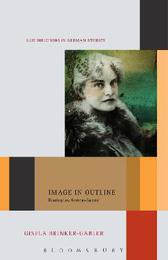
|
Image in Outline: Reading Lou Andreas-Salome
Paperback / softback
Main Details
Description
Image in Outline introduces the reader to Lou Andreas-Salome's significant engagement with modern thought. Through detailed explorations o fsome of her major texts, Brinker-Gabler examines Andreas-Salome's contributions to contemporar ydiscourses on meaning, perception, memory, and the unconscious. Situating her analyses within Andreas-Salome's historical, social, and intellectual contexts, this new reading utilizes a theoretical frame informed by thinkers such as Benjamin, Bergson, and Freud, and current theoretical perspectives by Irigaray, Grosz, and Kristeva. Brinker-Gabler argues that Andreas-Salome - committed as she was to the"double direction" of rigorous thought and individual nuancing - refocused dominant visions of gender, sexuality, culture, religion, and creativity through a female lens. In a "disenchanted world" (Weber), Andreas-Salome offered an image epistemology or"aesthetics of b(u)ilding," as Brinker-Gabler calls it, that seeks to retrieve the multilayered past embedded in individuals and cultural forms, thus providing positive accounts of sexual and cultural difference,experience, narcissism, and creativity in modern life.
Author Biography
Gisela Brinker-Gabler is Professor of Comparative Literature at The State University of New York at Binghamton, USA. She has previously taught at the University of Cologne (Germany), the University of Essen (Germany), and the University of Florida (USA). She is the author or editor of fourteen books, including Deutsche Dichterinnen vom 16. Jahrhundert bis zur Gegenwart (1978, 5th revised and extended edition 2007), Writing New Identities: Gender, Nation, and Immigration in Contemporary Europe (1996), and "If We Had the Word. "Ingeborg Bachmann: Views and Reviews (2004, with Markus Zisselsberger).
ReviewsProceeding from its lucid analysis of relatively known territory in Andreas-Salome criticism-the 'Human Being as Woman' essay - to the less discussed Rilke texts, Brinker-Gabler's Image in Outline: Reading Lou Andreas-Salome opens new vistas and insights on Andreas-Salome's surprisingly multidisciplinary writings and thought. Fascinating throughout is the kaleidoscope of links that integrate Andreas-Salome's developments to a broad historical range of influences and echoes, likewise preceding from the known - Nietzsche, Freud - to the new, fostering new insights on this author's range and contexts: back to Spinoza, Baroque emblems, Leibniz,and Darwin; forward to Irigaray, Kristeva, and Benjamin. Theoretically dense yet lucid, Image in Outline is a welcome new pillar in recent decades' discourse on Andreas-Salome's contribution to modern cultural and literary thought at the turn of the twentieth century. * Raleigh Whitinger, Professor of German, University of Alberta, Canada * With this book, Gisela Brinker-Gabler makes an important contribution to the scholarship on Lou Andreas-Salome, bringing Andreas-Salome into dialogue with some of her own contemporaries, such as Henri Bergson, Walter Benjamin, and Martin Buber, as well as with some of our contemporaries, including Luce Irigaray, Elizabeth Grosz, and Julia Kristeva. Brinker-Gabler shows convincingly that Andreas-Salome was an important and innovative modern thinker who made significant contributions to discourses on gender and cultural difference, border crossings, creativity, and the human condition. This book will be of interest both to Lou Andreas-Salome scholars and to those who want to learn more about the interdisciplinary discourses circulating in Europe at the turn of the last century. * Muriel Cormican, Professor of German, University of West Georgia, USA * Brinker-Gabler's erudition is stunning; she clearly commands voluminous knowledge of modern literature and philosophy and draws on this knowledge to make connections and illuminate points ... Image in Outline clearly succeeds in its aim of locating Andreas-Salome's work in the context of contemporaneous and future theories ... Scholars of modernism should read this book, for it allows a voice and a context to emerge that have received less critical attention than they deserve. * German Studies Review, Volume 38, Number 2, May 2015 (reviewed by Laura Deiulio, Christopher Newport University, USA) * Brinker-Gabler offers readings of a number of Andreas-Salome's nonfictional works that (with the exception of "Der Mensch als Weib") have received little or no critical attention up to now. In her exploration and explication of Andreas-Salome's thought, she draws on a wide and interesting variety of thinkers from Spinoza, Leibniz, and Darwin to Benjamin, Irigaray, and Derrida ... Given its broad scope, this book promises to be of interest to everyone who works on the artifacts and the culture of the twentieth century, whether Germanists or not. * Monatshefte, Vol. 106, No. 3, 2014 (reviewed by Muriel Cormican, University of West Georgia, USA) * The author makes generous use of Andreas-Salome's rich oeuvre and filters her analysis through the prism of Walter Benjamin, Henri Bergson, Wilhelm Dilthey, Luce Irigaray, Julia Kristeva, Gilles Deleuze, Felix Guattari, et al. to make her point that Andreas-Salome was part of the avant-garde of her generation, contributing to understanding of gender differences, advancing psychoanalysis with a varied view of narcissism and a subtle concept of post-mourning, furthering modernism's critique of rationalism and positivism, helping to shape that paradigm shift at the turn of the 20th century. Summing Up: Recommended. Graduate students, researchers, faculty. * Choice (reviewed by R. C. Conard, University of Dayton) *
|